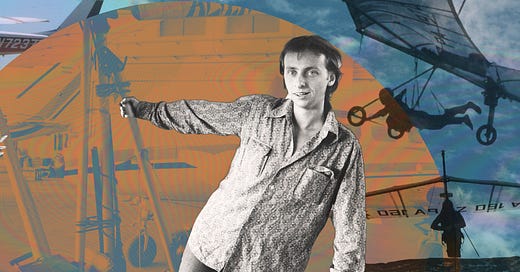The Man Who Pierced the Iron Curtain in a Flying Go-Kart – and Left Civilization Forever
Escaping Communism in a DIY aircraft wasn’t enough for Ivo Zdarsky. So he invented his own way of life — in a Utah desert ghost town.
For Narratively’s inaugural Profile Prize writing contest, we put out the call for articles about people with surprising, inspiring or groundbreaking life stories. No “or” needed here — Ivo Zdarsky's bio has enough surprise, inspiration, and ground-breaking-ness to last a lifetime. Congrats to journalist Andy Rieber for writing this incredible tale, one of two stories selected as a finalist for the Prize. Andy's writing is so gorgeous and evocative — when reading this piece, you'll feel like you're right alongside Ivo, flying over the Utah desert. Enjoy!
On August 4, 1984, at 4 a.m., the slumbering pre-dawn calm over Vienna, Austria, was rent by a lawnmower-like whine. The sound was initially faint, an irritating mosquito. But it gradually swelled to a raspy, grating two-stroke crescendo raking Vienna’s rooftops. The racket came from the engine of a Trabant, that reliably unreliable car manufactured not far away in Communist East Germany at the plant in Zwickau. The Trabant engine came in hot from the east at around 700 feet, then lazily circled over the sleeping city with no apparent plan. The noisy little two-stroke was not flying solo. Rotating on the engine’s drive shaft whirred a fiberglass propeller. Engine and prop were bolted to the backend of a skeletal go-kart contraption with a hammock-like seat and landing gear consisting of three wheels previously employed by wheelbarrows. A motorcycle gas tank was mounted atop the engine. Holding the entire assemblage aloft in the graying Vienna morn was a 30-foot pair of collapsible hang glider wings.
Recumbent in the hammock seat sat a man wearing an orange and black striped motorcycle helmet.
The man and his flying machine took an aerial tour of the city, casually buzzing the slow-rolling Danube and grand boulevards, then approached Vienna International Airport. He throttled back the whining engine to a loud farty putter, dropping the go-kart’s altitude ever lower until the wheelbarrow wheels touched down on a taxiway. He maneuvered his aircraft under the wing of a Boeing jet and came to a halt next to a hangar where the Trabant guttered to a stop, a filthy white ghost of exhaust dissipating into the air. There was a momentary hush. Then someone on the early, early shift at the airport took notice. Uniformed maintenance men ran out of the hangar, waving their arms and shouting in German. The man in the go-kart calmly climbed out of his hammock onto the tarmac. He removed his helmet and held out an expired Czechoslovakian passport. In halting English, Ivo Zdarsky declared: “I would like to claim political asylum.”
The first time I met Ivo was March 2, 2022, in Lucin, Utah, a ghost town and former stop on the Central Pacific Railroad. Ivo resides out there alone on the alkali desert as a hermit, his dwelling an airplane hangar. There’s no missing the fact that the desolate West Desert of Utah is one hell of a long way — physically, politically, psychically — from the Soviet police state that was Czechoslovakia in the 1980s. Lucin, just to be clear, is not “in the country.” It sits on the parched, prehistoric lakebed of extinct Lake Bonneville, surrounded by glinting expanses of salt flats and floating mountain ranges that were once islands, submerged up to their necks in the lake. To find a more Martian landscape, you’d have to fly to Mars. The path of Ivo Zdarsky presents a puzzle: By what star did this man navigate from Communist Bohemia to utterly remote, uninhabited Lucin? I had read a short account of Ivo in a local newspaper titled “The Most Interesting Utahn You’ll Never Meet.” Well, I lived a short two hours away in Elko, Nevada, and I was curious.
Keep reading with a 7-day free trial
Subscribe to Narratively to keep reading this post and get 7 days of free access to the full post archives.





